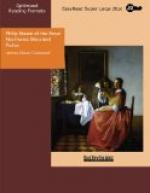He was on a sledge. Through the air-holes in his prison he heard the scraping of strap-thongs as they were laced through the runner-slits and over the box, the restless movement of dogs, a gaping whine, the angry snap of a pair of jaws. Then, slowly, the sledge began to move. A whip cracked loudly above him, a voice rose in a loud shout, and the dogs were urged to a trot. Again there came to Philip’s ears the wheezing notes of the accordion. By a slight effort he found that he could turn his head sufficiently to look through a hole on a level with his eyes in the side of the box. The sledge had turned from the dark trail into the lighted street, and stopped at last before a brilliantly lighted front from which there issued the sound of coarse voices, of laughter and half-drunken song.
One of his captors went into the bar while the other seated himself on the box, with one leg shutting out Philip’s vision by dangling it over the hole through which he was looking.
“What’s up, Fingy?” inquired a voice.
“Wekusko,” replied the man on the box, in the husky, flesh-smothered tones of the person who had entered last into the cabin.
“Another dead one up there, eh?” persisted the same voice.
“No. Maps ‘n’ things f’r Hodges, up at the camp. Devil of a hurry, ain’t he, to order us up at night? Tell —— to hustle out with the bottle, will you?”
The speaker sent the lash of his whip snapping through the air in place of supplying a name.
“Maps and things—for Hodges—Wekusko!” gasped Philip inwardly.
He listened for further information. None came, and soon the man called Fingy jumped from the box, cracked his whip with a wheezing command to the dogs, and the sledge moved on.
And so his captors were taking him to Wekusko?—and more than that, to Hodges, chief of construction, whose life had been attempted by the prisoner whom Inspector MacGregor had ordered him to bring down! Had Fingy spoken the truth? And, if so, was this another part of the mysterious plot foreseen by the inspector?
During the next half hour, in which the sledge traveled steadily over the smooth, hard trail into the north, Philip asked himself these and a score of other questions equally perplexing. He was certain that the beautiful young woman whom he had followed had purposely lured him into the ambush. He considered himself her prisoner. Then why should he be consigned, like a parcel of freight, to Hodges, her husband’s accuser, and the man who demanded the full penalty of the law for his assailant?
The more he added to the questions that leaped into his mind the more mystified he became. The conflicting orders, the strange demeanor of his chief, the pathetic appeal that he had seen in the young woman’s eyes, the ambush, and now this unaccountable ride to Wekusko, strapped in a coffin box, all combined to plunge him into a chaos of wonder from which it was impossible for him to struggle forth. However, he assured himself of two things; he was comparatively comfortable, and within two hours at the most they would reach Hodges’ headquarters, if the Wekusko camp were really to be their destination. Something must develop then.




